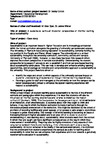SUSTAINABLE HERITAGE MANAGEMENT PRACTICES AT VISITED HERITAGE SITES IN DEVON AND CORNWALL
| dc.contributor.supervisor | Brayshay, Mark | |
| dc.contributor.author | Darlow, Susan Elizabeth Joan | |
| dc.contributor.other | Faculty of Science and Engineering | en_US |
| dc.date.accessioned | 2011-06-07T14:07:04Z | |
| dc.date.available | 2011-06-07T14:07:04Z | |
| dc.date.issued | 2011 | |
| dc.date.issued | 2011 | |
| dc.identifier | 701402 | en_US |
| dc.identifier.uri | http://hdl.handle.net/10026.1/482 | |
| dc.description.abstract |
Sustainability is one of the key challenges facing society in the twenty-first century. The adoption of sustainable practices in the heritage sector resonates with its long-established objectives to conserve and enhance the historic environment, although its implementation can also present significant dilemmas for the commodification, integrity, authenticity, accessibility and viability of these resources, particularly where sites are tourist attractions. The aim of this thesis was to investigate progress in the adoption of sustainable practices in heritage properties and sites in Devon and Cornwall. The findings were based on the compilation of an inventory of selected heritage resources; an extensive questionnaire survey of managers of historic houses and castles, historic churches, and museums and archives (416 responses), which investigated the extent of, and opinions about, sustainable management approaches; and semi-structured, face-to-face interviews with eight heritage managers, which probed key issues in much greater depth. The results of the research demonstrated some similarities with the adoption of sustainable practices in other sectors, such as the practical issues associated with costs and lack of knowledge. There were also some heritage-specific issues, such as perceived conflicts with protection duties, the consequences of being largely dependent upon volunteer staffing, and the institutional role of larger parent organisations, which have been overlooked in previous research. Most significantly, the results indicated that very few heritage sites produced sufficient surpluses to facilitate investment in sustainable practices that might ultimately enhance their financial viability and fund enhanced conservation activities. Future strategies for the sector as whole must therefore not only deal with capacity-building, such as access to information and training on sector-specific sustainable management, but also address the institutional factors governing heritage in the UK, such as strategic leadership, the most effective models for governance and funding mechanisms for sustainability, and the creation of local and regional heritage networks. | en_US |
| dc.language.iso | en | en_US |
| dc.publisher | University of Plymouth | en_US |
| dc.subject | Economic sustainability | |
| dc.subject | Socio-cultural sustainability | |
| dc.subject | Environmental sustainability | |
| dc.subject | Historic sites | |
| dc.subject | Sustainable Heritage Management | en_US |
| dc.title | SUSTAINABLE HERITAGE MANAGEMENT PRACTICES AT VISITED HERITAGE SITES IN DEVON AND CORNWALL | en_US |
| dc.type | Thesis | |
| dc.identifier.doi | http://dx.doi.org/10.24382/1568 |
Files in this item
This item appears in the following Collection(s)
-
01 Research Theses Main Collection
Research Theses Main



